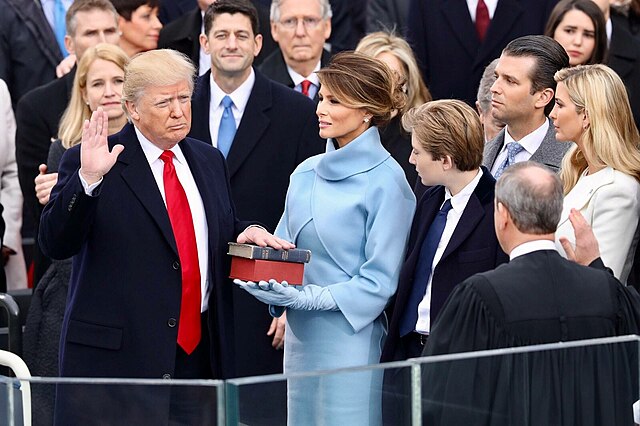Hours after being inaugurated as the 47th President of the United States, Donald Trump scurried into Washington, D.C.’s Capital One Arena to sign a flurry of executive orders before a crowd of rabid fans. Trump has already signed 45 executive orders, with 26 of them signed on Inauguration Day. These orders included declaring a national emergency at the border, suspending refugee resettlement programs, ending birthright citizenship, placing a freeze on federal hiring, defining only two biological sexes, and directing federal agencies to end Diversity, Equity and Inclusion (DEI) programs.
The theatrics of signing executive orders before a cheering crowd, the dramatic changes and reversals brought upon by the orders and their sensationalist titles that could be mistaken for a histrionic social media meltdown all resemble a provocative reality show environment. Everything about the executive orders are provocative because Trump is, first and foremost, a showman. However, the ostentatious nature of Trump’s policy does not make it any less dangerous — quite the opposite. Within the past week, we have seen ICE raids tear families apart, recent grads have their job offers rescinded and the CDC take down several web pages that do not align with Trump’s gender views.
Within our own Wellesley community, the effects are apparent. The federal freeze has threatened funding for labs and left students scrambling as their job and internship offers are rescinded. Trump’s changes to immigration policy has resulted in family members targeted and deported and students on visas facing stricter scrutiny. The order on sex and gender explicitly erases members of our community.
The year has begun with Project 2025 unfolding before our eyes, with even some of the more incredulous policies seeming like a possibility in our current reality. Trump’s abuses of presidential power have wreaked tangible havoc, and it feels almost as if we are trapped and powerless as we watch the world around us crumble.
Yet on another level, we can see that these chaos-fueled orders do not make sustainable policies. Nearly a week after issuing the federal freeze, the White House rescinded the memo, and a U.S. district judge blocked the freeze. Although the language is still a bit unclear (White House Press Secretary Karoline Leavitt claims the rescission refers to the memo issuing the freeze, and not the freeze itself), the backtracking suggests that perhaps finally, someone in the White House realized that firing off several sweeping, nonsensical orders does not make a good long-term plan. A platform built on riling up the most extreme emotions cannot last — authoritarianism’s facade is cracking.
I know I’m preaching to the choir when complaining about Trump’s executive orders to the Wellesley College student newspaper. We all know that these orders are not great. However, I want to examine where we stand, and what path we will take next. We stand at a confusing crossroads. On one hand, we see the fragile nature of Trump’s politics. Yet on the other hand, we see the immediate destruction it can cause. We cannot deny the most vulnerable in our society, whose livelihoods are being threatened. We cannot downplay the danger they face.
I think that in the face of this paradoxical mix of incompetent danger, we cannot hope the problems will sort themselves out, we cannot wait out another election to reverse the damage. Even though cracks will likely emerge, the time we spend waiting is just more time for people to get hurt. Now is the time to organize. Now is the time to fight back.
Stay informed on what Trump is doing and what effects these decisions will have, but don’t fall into the trap of overwhelmed doom scrolling. Connect with students on the Wellesley campus and beyond. Listen to the experiences of those who are impacted by these decisions, and center their voices in your activism. Join mutual aid networks to support our communities when they come under attack. Keep talking — don’t let these orders become our new normal. We see the cracks in the surface, which means that if we come together, we can bring it down. We just can’t let them bring us down first.




